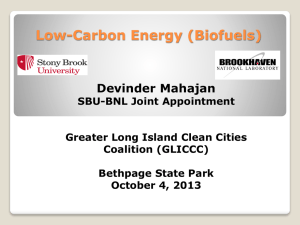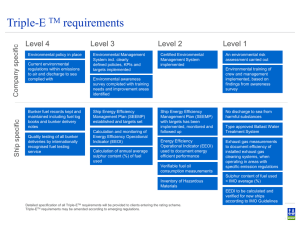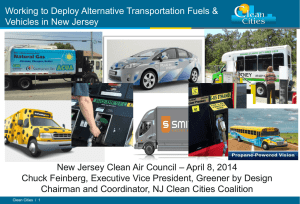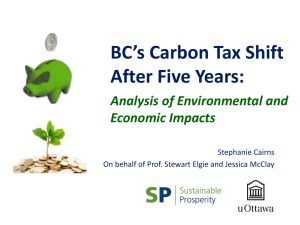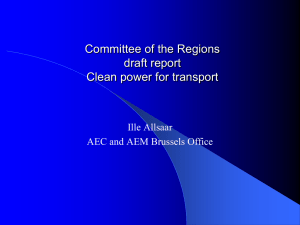Consumer Market Study on the functioning of
advertisement
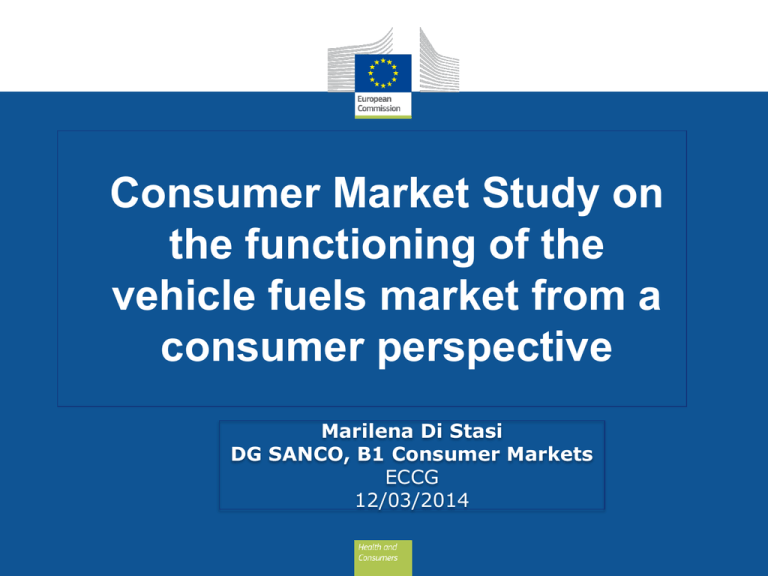
Consumer Market Study on the functioning of the vehicle fuels market from a consumer perspective Marilena Di Stasi DG SANCO, B1 Consumer Markets ECCG 12/03/2014 Key points • Rationale Follow up to negative findings of 6th Consumers Market • • Scoreboard: ranked 2nd lowest in the goods market; below average on almost all the MPI components: trust, comparability, problems and consumers' expectations. Research questions Information to consumers Knowledge of the market Price information, transparency, and competition Price fuel comparison websites Potentially vulnerable groups Recommendations & next steps What's the best choice? Is it the right fuel? Are fuels compatible with my car? Research questions Are consumers able to make informed choices including: understanding information on labels at petrol stations; understanding differences between fuel types; suitability of different fuels for specific vehicles. How to standardise / harmonise labelling-at-the- pump practices (esp. those with biofuel content e.g. E10 and B7); Consumer perceptions of sustainability of biofuels compared to fossil fuels (including environmental / sustainability concerns affecting purchasing decisions); Availability of different fuel and retailer types; Retail prices. Methodology The study and data collection cover 27 Member States, Iceland and Norway. (was carried out before HR joined) All 29 countries covered through: • Stakeholder organisations survey • Consumer survey • Price collection • Mystery shopping exercises Study makes mainly use of data collected in the period 2012-2013. Information sources Consumers most often look for information on vehicle fuels at the pump. Consumers are most likely to look for information about vehicle and fuel compatibility at pumps and the vehicle’s operating manual. How easy is it to find clear information about… Example of very good labelling Ron Fuel denomination Coloured label on the nozzle Is this fuel petrol or diesel? Note black nozzle! Examples of confusing labelling Look at the different colours and names of the available fuels. And the RON ? General knowledge about fuels very poor Price information, transparency and competition Price differentials between regions: • Motorway prices generally more expensive than those in capital cities and rural regions. Price differentials between days of the week: • Change by less than 1% between Monday and Friday, but prices can change several times a day. Price differentials between manned and unmanned stations: • Unmanned stations sell fuels at lower prices than their manned counterparts (except Greece). But supermarket stations by far the cheapest followed by independent and non-major brands. Price fuel comparison websites 60 comparison websites assessed (only in SI no website identified). Information on the following items should be better listed • More up-to-date prices • More help and information selecting correct fuel type • More reporting on fuel quality norms or comparison test results • Expanded availability and coverage • Clearer explanations of environmental issues • Clearer data sources • Better accessibility and more information for people with disabilities. Potentially vulnerable consumers • Little or no disposable income: More troubled by high prices and price increases. They fill up whenever they can afford it, and report higher financial detriment in case of problems. • Consumers living in rural areas: less choice and only one type of vehicle-compatible fuel in the area they live: e.g. they buy less branded fuels. • People with reduced mobility: many stations lack handicapaccessible toilets and many CWs lack search functionality tools. • Older consumers: reliance on labelling at the pump increases with age (including fuel compatibility with vehicle). • Consumers who drive old vehicles: experience less problems but also drive less. • Consumers who buy fuel outside their country of origin: experience less problems but are better educated and more knowledgeable about vehicle fuels. But different language fuel denominations may lead to less certainty in identifying one's most suitable/preferred vehicle fuel type. Recommendations - Improving consumer conditions • • • • • Improving information provision to facilitate informed decisionmaking on: regular fuels, biofuels, quality of fuels put in the market, performance of various fuel types; and the quality of information provided on comparison websites; Introducing an EU-wide colour-coding scheme for fuel labelling at the pump to indicate on the one hand, regular petrol (green), and on the other regular diesel fuel (black) as is already widely the case; Ensuring consumer choice and price competition through vehicle fuel price notification systems and setting up smart mobility portal; Addressing consumer problems by improving preventive and enforcement measures; Improving services provided to persons with disabilities at petrol stations. Next steps Staff Working document to be released during the first half of the year jointly with the study and key deliverables. Q&A Thank you! marilena.di-stasi@ec.europa.eu




